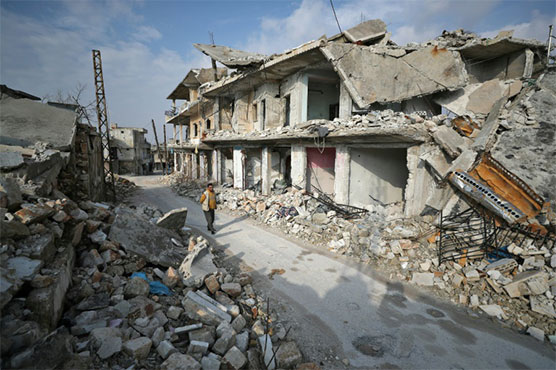Russia warns Turkey, blocks UN bid to end Syria bloodshed

Russia on Wednesday warned Turkey against intervening in Syria.
ISTANBUL (AFP) - Russia on Wednesday warned Turkey against intervening in Syria as it blocked a UN bid to end the Damascus regime s brutal assault on the last rebel enclave.
Syrian aid workers called urgently for a ceasefire and international help for nearly a million people fleeing the regime onslaught in the country s northwestern Idlib province -- the biggest wave of displaced civilians in the nine-year conflict.
Turkey, supporter of some rebel groups in Idlib, has been pushing for a renewed ceasefire in talks with Russia, which backs the Syrian regime. Ankara is eager to prevent another flood of refugees into its territory adding to the 3.7 million Syrians it already hosts.
The Syrian NGO Alliance said displaced people are "escaping in search of safety only to die from extreme weather conditions and lack of available resources".
"We have hundreds and thousands of people who are fleeing... not just from bombardments but from lack of insulation, from the weather, a lack of heating. It feels like doomsday," Razan Saffour, of the Syrian Expatriate Medical Association, told AFP in Istanbul.
The group said a total of $336 million was needed for basic food, water and shelter. Education resources were also needed for 280 million displaced school-age children.
Turkish President Recep Tayyip Erdogan said talks with Moscow over the past fortnight had so far failed to achieve "the desired result" and warned that Turkey would launch an offensive into Syria unless Damascus pulled its forces back by the end of the month.
"An operation in Idlib is imminent.... We are counting down, we are making our final warnings," Erdogan said in a televised speech.
He called for Syrian forces to retreat by the end of this month behind Turkey s military posts in Idlib, which were set up under a 2018 deal with Russia designed to hold off a regime advance.
The Kremlin quickly responded to Erdogan s threat, saying that Turkey should instead act against "terrorist groups" in Idlib.
"If we are talking about an operation against the legitimate authorities of the Syrian republic and armed forces of the Syrian republic this would of course be the worst scenario," Kremlin spokesman Dmitry Peskov told reporters in Moscow.
With Turkey moving large numbers of reinforcements into Idlib in recent weeks, Defence Minister Hulusi Akar emphasised that it was "out of the question for us to withdraw from our observation posts".
"If there is any sort of attack against them, we will retaliate in kind," he told reporters in Ankara.
Russia, which along with Iran backs Syrian President Bashar al-Assad, has repeatedly vetoed UN resolutions on the conflict as it hopes for the triumph of the regime.
At the United Nations, diplomats said they were unable to produce a statement on ending the fighting due to Russian objections.
"We tried very hard to have a press statement calling for cessation of hostilities and humanitarian access to Idlib," said Nicolas de Riviere, the French ambassador to the United Nations.
"Basically Russia said no , which is very painful," he told reporters.
The UN envoy to Syria, Geir Pedersen, confirmed that no progress had been made either in several rounds of talks between Turkey and Russia held in Ankara and Moscow.
"To the contrary, public statements from different quarters, Syrian and international, suggest an imminent danger of further escalation," he told the UN Security Council.
Earlier this week the United Nations said the displaced were mainly women and children. It warned that babies were dying of cold because aid camps are full.
The Syrian NGOs called for the warring parties to allow safe access for humanitarian groups and for a "complete ceasefire and end to human rights violations".
According to the British-based Syrian Observatory for Human Rights, the regime offensive has killed more than 400 civilians since it began in December, adding to the toll of more than 380,000 who have died in the years of unrest.
"The violence in northwest Syria is indiscriminate. Health facilities, schools, residential areas, mosques and markets have been hit," the UN head of humanitarian affairs and emergency relief, Mark Lowcock, said earlier this week.
The head of the World Health Organization said Tuesday that out of nearly 550 health facilities in northwest Syria, only about half were operational.
"We repeat: health facilities and health workers are not a legitimate target," Tedros Adhanom Ghebreyesus told journalists in Geneva.
Syrian troops have reconquered swathes of Idlib and retaken the key M5 highway connecting the country s four largest cities as well as the entire surroundings of Aleppo city for the first time since 2012.
Oxfam said that two of the British aid group s local workers died in an attack on Wednesday elsewhere in Syria in the southern Daraa area.

